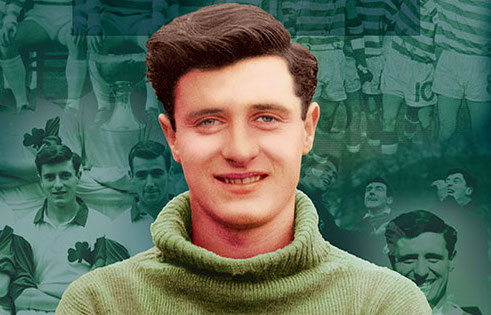
One of his teachers there was Bob Crampsey who would become a TV presenter, pundit and general football expert in later years. Another teacher was called John Murphy, and he was the loudspeaker announcer at Celtic Park. Both these men would have a great effect on Charlie. Crampsey in particular knew what he was talking about.
Keen on cricket, music and many other things like the American Civil War, he won the Brain of Britain radio quiz in 1965 and became Headmaster of St Ambrose High School, but was best known for being one of the three anchors of STV’s Scotsport when it started in 1957. Alec Cameron and Arthur Montford were the other two.
Crampsey was a true polymath and became an excellent writer and commentator on the Scottish game. While he was at Holyrood, football flourished and was much talked about. Charlie Gallagher, a bright boy who did well enough academically as well, took to playing football in the same way as a duck takes to water. Schools Football in the 1950s was big. It is a shame that the teachers’ pay dispute of 1984-86 severely curtailed teachers’ involvement with their pupils on a Saturday morning.
Schools Football has taken a huge dip, and this is a great shame for so many young players used to learn their craft at school under the guidance of enthusiastic and dedicated teachers who were doing it all for the love of the game. In Charlie’s day, more or less every blade of grass in Glasgow (sometimes not even grass, more often sand!) would be covered by a school football match on a Saturday morning.
The games would be played at all levels from 1st year to 6th year, and for every youngster it was a great honour to be playing for the school team. The “home” school would supply the referee, and every game would attract a fair amount of parents, some of them fiercely committed to the cause of their son’s school. Occasionally, hysterical things happened.
A father of a goalkeeper was standing behind his son’s goal. The son was beaten and the ball was trickling slowly, held back by the mud, but inevitably to the goal line. There was no goal net, however, and suddenly the father ran out and kicked the ball clear! At another game, a mother (an even more hysterical breed of people than fathers) saw fit to criticise the referee and was not shy of using foul language. At one point, when the referee awarded a throw-in in what she saw was the wrong way, she exploded and said “Screw me!”. The referee, who was only a couple of yards away replied “No thanks, ma’am, I’m rather particular” and charged up the field.
A teacher of a defeated team in a Scottish School Cup game objected on the grounds that one set of goalposts was smaller by 3 inches than the other. The Headmaster went out one wet Thursday afternoon with a tape measure and discovered that both sets were exactly the same!
On another occasion, a real thug of a boy was being excluded by the Headmaster for a rather nasty piece of violence and vandalism in the toilets. The teacher in charge of football, realising that the suspension would rule the boy out of a vital Cup tie, intervened on his behalf, using the immortal phrase that on the field he was “a gentle giant”.
More seriously, Schools Football was an avenue for a talented boy to earn himself a chance to play a Schools representative game at the ground of a top team. There were even Schoolboy Internationals against the other three British nations, and these games were great showpieces for the youngsters to show off their talents and attract the attention of top teams. Even the run of the mill Saturday morning games were covered by the Press now and again – annoyingly not comprehensively for you could not guarantee that any given game would get a mention, nor necessarily always very accurately – by reporters calling themselves scholastic names like “Prefect” or “Inspector” who used educational imagery like “six of the best” or “teaching lessons in the football classroom of the field” and so on.
In Glasgow and the surrounding district, there was the added element of religion. Everyone knew which school was a “Catholic” school, and what was not. There is the true story of a Rangers scout who turned up to watch a Lanarkshire School Cup final in the hope of spotting some talent. On discovering that the final would be contested by two Roman Catholic schools, he went way home, knowing that his club would not be interested in signing any of the 22 players, no matter how good they were!
Charlie would often find himself playing two games on a Saturday – for the school in the morning and the Boys Guild in the afternoon. This left very little time for him to go and watch the team that he loved and whom everyone in the Gorbals talked about. In any case Celtic Park was a little too far from his house, but he does recall occasionally going to see Clyde or Third Lanark whose grounds were nearer. Clyde played at Shawfield, the dog track, before they moved to Broadwood in Cumbernauld, and Third Lanark went bankrupt and folded in 1967.


